
Mev Armon left QE’s CCF fighting fit as he started a new role with Hertfordshire constabulary.
The Headmaster says: “For more than a generation, Mev has been an inspiring, supportive and charismatic teacher and colleague. His service to our cadets has been immense, and he has been something of a legend as a form tutor. We wish him all the best as he continues his public service in a new role.”
Captain Armon (formerly Major Armon) leaves after 30 years in the Biology department and 23 years with the Combined Cadet Force. The CCF contingent held a special parade in the Main Hall, where they honoured his service.
The parade was also a celebration of those cadets gaining a promotion. With more than 50 cadets attending, it was an indication of the CCF’s current strength. “That strength is due in no small part to Mev’s dedication over the years,” Mr Enright said.
QE is one of very few state schools to have a CCF. After the celebrations, Mr Armon spoke of how the CCF develops key skills such as leadership, teamwork and resilience, transforming boys into young men who are – in the words of the School’s vision – confident, able and responsible. He will continue to be an occasional volunteer with the QE CCF.
Among those wishing him well were a large number of Old Elizabethans. Here is a selection of these comments:
- Abhinav Vepa (2003–2010): “I always looked forward to your classes and CCF because you made us all laugh a lot with your great sense of humour! Good luck in the new role. Thanks for everything you offered to me, CCF, and the School.”
- Kiran Patel (2000–2007): “I had the privilege of being taught Science or Biology in almost every year during my time at QE by Mr A: Mev Armon, your contributions to your students’ development have been immense, and have inspired and encouraged so many of us particularly in the study of the sciences and medicine, not to mention CCF. “
- Anirudh Bandaru (2009–2016): “Mev Armon is the best! His teachings stuck with me when I deployed on operations, and I wouldn’t have joined the Army if it wasn’t for Sir’s encouragement and mentorship.”
- Ben Swart (1994–2001): ” I have core memories of that smile, of many conversations with him as our form tutor, and of the funkiest car alarm I could ever remember.”
- Kartik Gohil (2004–2011): “You were the heart and soul of the CCF.”
Click on the thumbnails to view the images below.


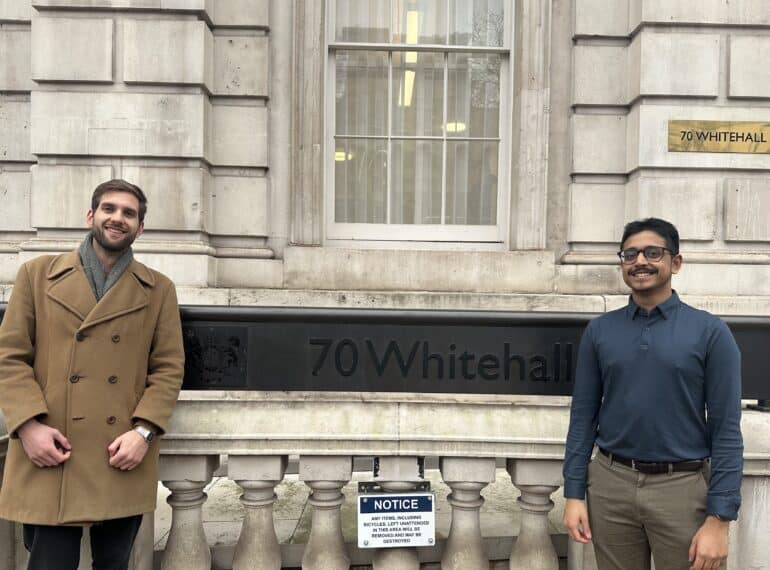
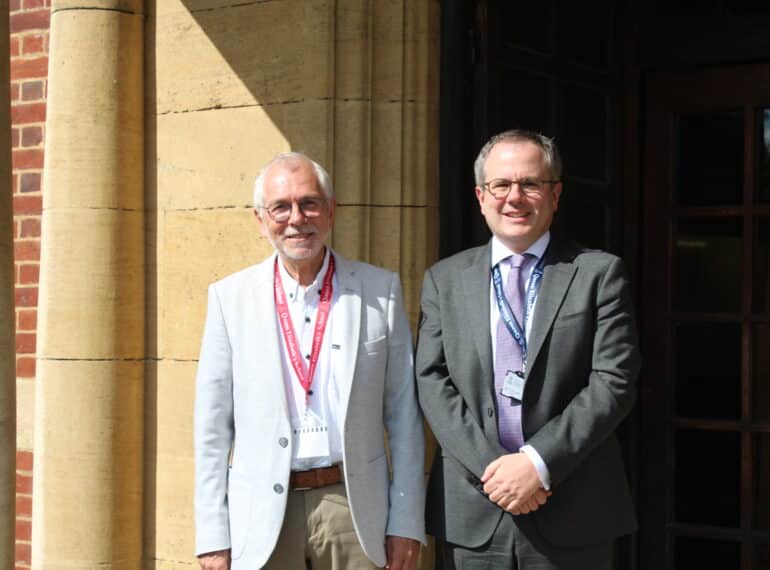
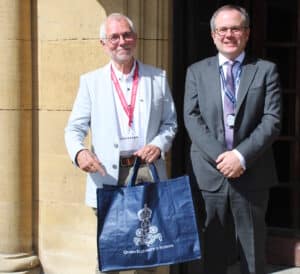 Almost half a century later, I decided to contact the School and ask whether I would be welcome to walk down memory lane one day in September 2024 – 50 years after I had first set foot there. I received a positive answer from Matthew Rose [Head of External Relations]. Both Matthew and the Headmaster made me feel very welcome on the day. I was shown around the buildings, I talked to a class of A-level students of German and I was invited to have a cup of coffee in the Headmaster’s study, where we had a lengthy conversation.
Almost half a century later, I decided to contact the School and ask whether I would be welcome to walk down memory lane one day in September 2024 – 50 years after I had first set foot there. I received a positive answer from Matthew Rose [Head of External Relations]. Both Matthew and the Headmaster made me feel very welcome on the day. I was shown around the buildings, I talked to a class of A-level students of German and I was invited to have a cup of coffee in the Headmaster’s study, where we had a lengthy conversation.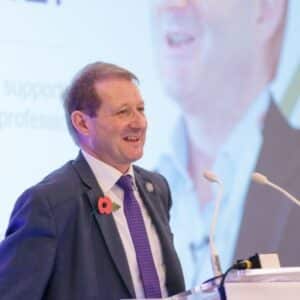 My main job, however, was to do German conversation lessons, grammar and vocabulary with the A-level students. Being 21, the age gap between the sixth-formers and me was not that large, and I spent as much time in the Sixth Form common room as in the teachers’ staff room. Even today I remember all my A-level students (Upper Sixth: Andrew Norris, Keith Newton [pictured here], John Dixon, Adrian (Sid) Sinclair, Alistair Johnstone, Lower Sixth: David Peacock and Steven Cohen) and also a number of other sixth-formers (David Hulford, Peter Ward and Ben Glatt, Mark Gardener). I still exchange Christmas cards with John, who went up to Oxford to read German, and I helped first Andy and, years later, Pete to find employment and settle down in Germany. Being busy with my own career and family I lost contact with them when they moved to other parts of Germany and started their families. With Steven I sometimes went to watch his favourite club, Spurs, (even though I was, and still am, an Arsenal fan) and I enjoyed the friendly banter there. With Ben G. and a few others I went to Knebworth Park to see Pink Floyd perform Wish You Were Here for the very first time in public, and with Andy and Dave I attended a number of Cambridge Folk Festivals in the following years.
My main job, however, was to do German conversation lessons, grammar and vocabulary with the A-level students. Being 21, the age gap between the sixth-formers and me was not that large, and I spent as much time in the Sixth Form common room as in the teachers’ staff room. Even today I remember all my A-level students (Upper Sixth: Andrew Norris, Keith Newton [pictured here], John Dixon, Adrian (Sid) Sinclair, Alistair Johnstone, Lower Sixth: David Peacock and Steven Cohen) and also a number of other sixth-formers (David Hulford, Peter Ward and Ben Glatt, Mark Gardener). I still exchange Christmas cards with John, who went up to Oxford to read German, and I helped first Andy and, years later, Pete to find employment and settle down in Germany. Being busy with my own career and family I lost contact with them when they moved to other parts of Germany and started their families. With Steven I sometimes went to watch his favourite club, Spurs, (even though I was, and still am, an Arsenal fan) and I enjoyed the friendly banter there. With Ben G. and a few others I went to Knebworth Park to see Pink Floyd perform Wish You Were Here for the very first time in public, and with Andy and Dave I attended a number of Cambridge Folk Festivals in the following years.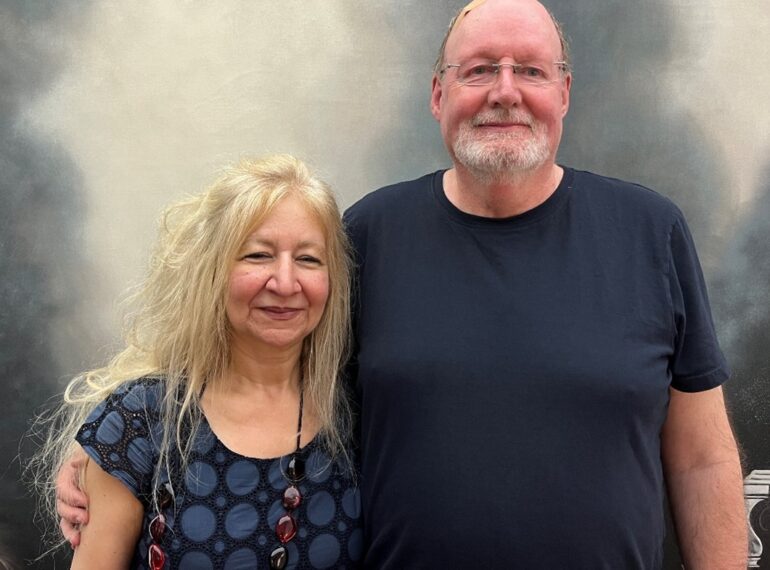
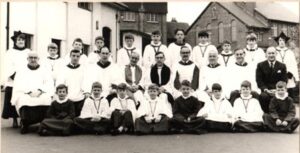 “Although I enjoyed school enormously and made many friends, I did not enjoy lessons – at the time I was not very academic,” he said. He was a choirboy during his QE years at St Mary’s Church, East Barnet, where both choirmasters were QE Physics teachers! Pictured here are Mr ARW ‘Gabby’ Hayes (third from the left in the second row) and Mr Donald Fairbairn (sixth from the left, also second row), with Andrew, aged about 12 or 13 (back row, second from the right).
“Although I enjoyed school enormously and made many friends, I did not enjoy lessons – at the time I was not very academic,” he said. He was a choirboy during his QE years at St Mary’s Church, East Barnet, where both choirmasters were QE Physics teachers! Pictured here are Mr ARW ‘Gabby’ Hayes (third from the left in the second row) and Mr Donald Fairbairn (sixth from the left, also second row), with Andrew, aged about 12 or 13 (back row, second from the right).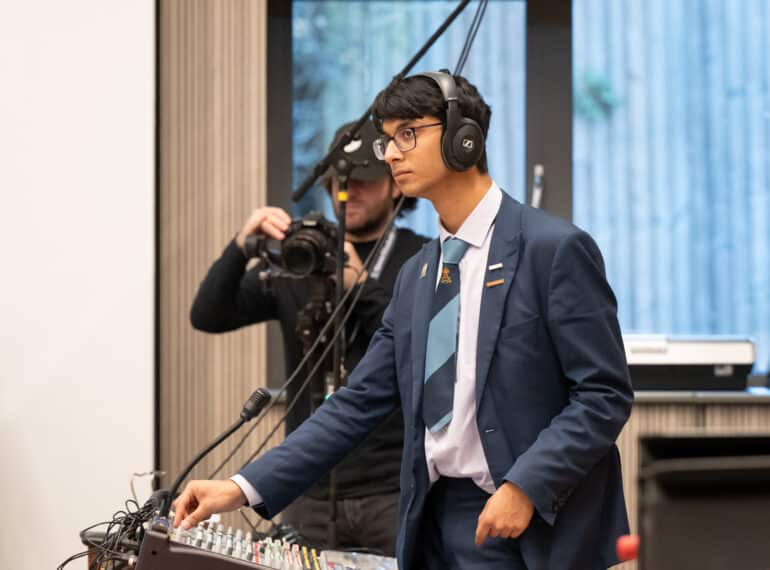
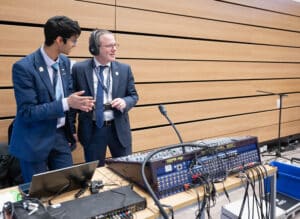 Director of Music Ruth Partington: “It was lovely to hear from Indrajit and I am so pleased that he has secured this scholarship. During his senior years as a pupil here, he was a mainstay of our concert support and was much valued within the Music department!
Director of Music Ruth Partington: “It was lovely to hear from Indrajit and I am so pleased that he has secured this scholarship. During his senior years as a pupil here, he was a mainstay of our concert support and was much valued within the Music department! The award is sponsored by AIR studios in Hampstead, established by Beatles producer Sir George Martin.
The award is sponsored by AIR studios in Hampstead, established by Beatles producer Sir George Martin.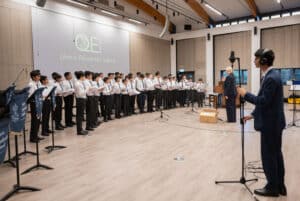 His A-level Music composition, Sonata for Live Piano and Electronics, broke new ground at QE with its blend of digital technology and live performance.
His A-level Music composition, Sonata for Live Piano and Electronics, broke new ground at QE with its blend of digital technology and live performance.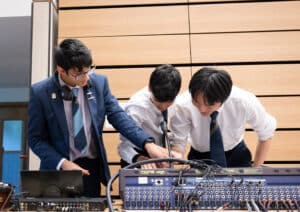 “My role at School has been fundamental in gaining knowledge and experience. I’ve been able to push the boundaries and use new techniques,” he said in the summer. “I go into my degree feeling very confident and a step ahead.”
“My role at School has been fundamental in gaining knowledge and experience. I’ve been able to push the boundaries and use new techniques,” he said in the summer. “I go into my degree feeling very confident and a step ahead.”